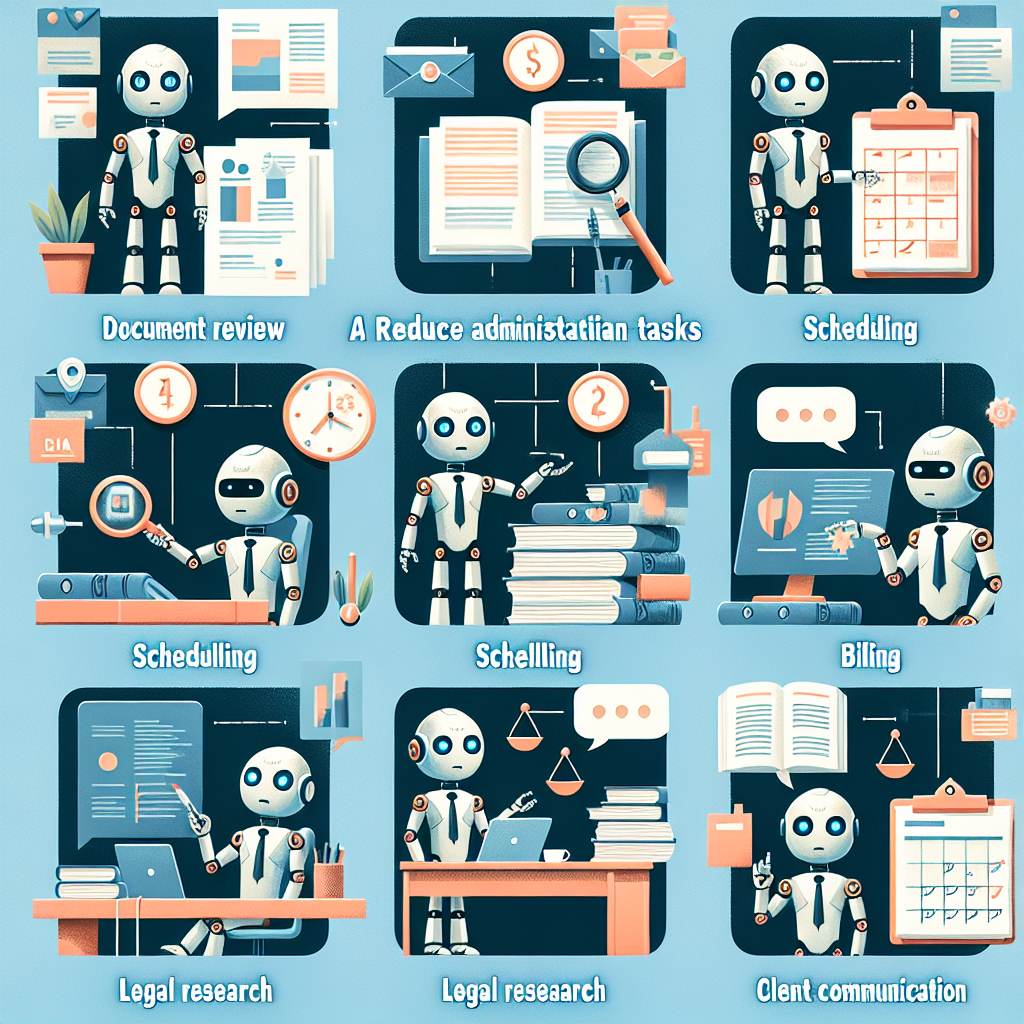5 Ways AI Can Reduce Administrative Tasks in Law Firms

Introduction
In the fast-paced environment of law firms, administrative tasks can often become a significant burden, diverting valuable time and resources away from core legal work. However, the advent of artificial intelligence (AI) offers transformative solutions to streamline these processes, enhancing efficiency and productivity. By automating routine tasks, AI can significantly reduce the administrative load, allowing legal professionals to focus on more strategic and client-focused activities. Here are five ways AI can revolutionize administrative tasks in law firms: from document management and data entry to scheduling and client communication, AI technologies are reshaping the legal landscape, offering innovative tools to optimize operations and improve service delivery.
Enhancing Legal Research Efficiency Using AI

AI is revolutionizing legal research by making it faster, more accurate, and less time-consuming. Here’s how:
Key Benefits:
- Automates Data Analysis:
- AI quickly analyzes case law, statutes, and legal precedents.
- Saves time compared to manual research, while ensuring up-to-date and comprehensive results.
- Identifies Patterns and Trends:
- AI detects subtle connections between cases and legal principles.
- Helps in building stronger legal strategies, especially in complex cases.
- Improves Document Review Accuracy:
- AI uses natural language processing to review contracts and legal documents.
- Identifies key clauses and risks, reducing human error and improving thoroughness.
- Enhances Knowledge Management:
- AI organizes and categorizes legal data, making it easy to access.
- Saves time in large firms where information is scattered across departments.
- Supports Predictive Analytics:
- AI analyzes past case outcomes to predict the likely result of a current case.
- Helps lawyers make informed decisions about case strategies and client advice.
AI-Powered Time Tracking And Billing Solutions
AI is transforming how law firms handle time tracking and billing, making these processes more efficient, accurate, and streamlined. Here’s how:
Key Benefits:
- Automated Time Tracking:
- AI automatically tracks billable hours, integrating with tools like calendars and emails.
- Reduces the risk of inaccuracies, underbilling, or overbilling, ensuring precise time recording.
- Simplified Billing:
- AI generates accurate invoices with minimal manual input, based on tracked time.
- Reduces administrative burden and helps ensure consistent, compliant billing.
- Data-Driven Insights:
- AI analyzes time and billing patterns, providing valuable insights to optimize workflows.
- Helps identify time-consuming tasks and optimize resource allocation for better efficiency.
- Personalized Client Billing:
- AI tailors billing communications to match individual client preferences.
- Improves client satisfaction and strengthens relationships through customized service.
- Enhanced Compliance and Security:
- AI tools ensure billing practices comply with legal industry standards.
- Robust security features protect sensitive client data, minimizing the risk of data breaches.
Improving Case Management With AI Integration
AI is revolutionizing case management for law firms by automating routine tasks, improving efficiency, and allowing legal professionals to focus on more strategic work. Here’s how:
Key Benefits:
- Faster Document Review:
- AI tools scan and categorize documents, highlighting key information and suggesting relevant case law.
- Reduces manual effort and minimizes human error, speeding up the review process.
- Efficient Legal Research:
- AI platforms analyze large legal databases to provide accurate insights and relevant case precedents quickly.
- Saves time and helps attorneys build stronger, more informed cases.
- Optimized Scheduling and Time Management:
- AI scheduling tools organize tasks, send reminders, and reschedule meetings based on availability.
- Ensures deadlines are met, improving client service and case outcomes.
- Enhanced Client Communication:
- AI chatbots and virtual assistants handle routine inquiries, provide case updates, and schedule consultations.
- Frees up attorneys’ time and improves client satisfaction with prompt responses.
- Streamlined Billing and Financial Management:
- AI tracks billable hours, generates invoices, and forecasts future billing trends.
- Ensures accurate billing and provides insights for better financial planning.
Leveraging AI For Efficient Data Entry And Analysis
AI is transforming how law firms handle data entry and analysis, making operations faster, more accurate, and more efficient. Here’s how:
Key Benefits:
- Automated Data Entry:
- AI tools with Optical Character Recognition (OCR) technology extract data from legal documents and case files automatically.
- Reduces time spent on manual data entry and minimizes human errors.
- Enhanced Data Analysis:
- AI can analyze vast amounts of legal data (case law, statutes, precedents) to identify patterns and trends.
- Helps lawyers make more informed decisions and predict case outcomes.
- Streamlined Document Management:
- AI systems categorize and organize legal documents for easy access and retrieval.
- Improves version control and ensures the latest documents are always available.
- Automated Client Communication:
- AI chatbots and virtual assistants handle client inquiries, schedule appointments, and send reminders 24/7.
- Frees up staff time and improves client satisfaction by providing instant responses.
- Regulatory Compliance:
- AI systems track and monitor regulatory updates to ensure the firm stays compliant.
- Automates compliance checks and reduces the risk of legal and financial penalties.
Conclusion
AI can significantly reduce administrative tasks in law firms through automation and efficiency improvements. Firstly, AI-powered document automation tools can draft, review, and manage legal documents, reducing the time lawyers spend on paperwork. Secondly, AI-driven legal research platforms can quickly analyze vast amounts of legal data, providing relevant case law and precedents, thus streamlining the research process. Thirdly, AI-based scheduling and calendar management systems can optimize appointment setting and deadline tracking, minimizing human error and time spent on coordination. Fourthly, AI chatbots and virtual assistants can handle routine client inquiries and communications, freeing up staff for more complex tasks. Lastly, AI can enhance billing and time-tracking processes by automatically recording billable hours and generating invoices, ensuring accuracy and efficiency. In conclusion, by leveraging AI technologies, law firms can significantly reduce the burden of administrative tasks, allowing legal professionals to focus more on strategic and client-focused activities, ultimately improving productivity and client satisfaction.

















































































































































































































































































































































































































































































































































